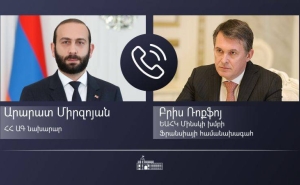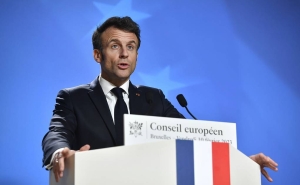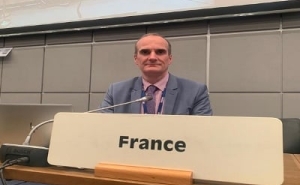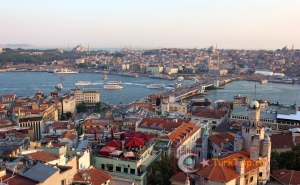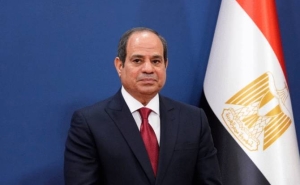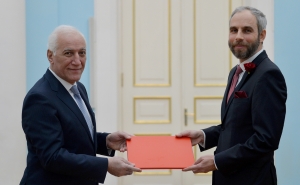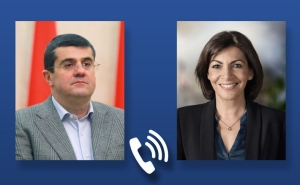Fillon, Le Pen, Hamon: The Three Candidates for French Presidential Elections of 2017

As in the runoff of January 29 Benoit Hamon won the Socialist Party nomination defeating France's Prime Minister Manuel Valls, and thus representing the left-wing and green side of the Party, now we already have three main candidates for French Presidential Elections of 2017.
''Armedia'' IAA looked through the views and ideas of the three candidates concerning both domestic and foreign policies, and here we have a comparative study of electional plans of Francois Fillon from the Republican Party, Marin Le Pen from the National Front Party, and Benoit Hamon from the Socialist Party.
Francois Fillon
Domestic policy
Fillon has been described as a reformist liberal. In defending a policy of controlling the deficit, Fillon is in favor of abolishing the wealth tax, which he considers one of the causes of the debt of France. According to him, this tax discourages foreign entrepreneurs. This tax would be off set by the creation of a top slice of income tax to 50%, which would be included in the CSG.
As a presidential candidate, Fillon aims to reduce the public sector and cut 500,000 civil-service jobs. Fillon has been compared to Margaret Thatcher due to his ambition to reduce the size of the state.
As member of the National Assembly Fillon voted against the legalization of same-sex marriage in 2013, but now, however, he says he will not ban the same-sex marriage law if elected President. He opposes adoption by same-sex couples. Fillon has stated that he is personally opposed to abortion but would not vote to ban it.
Immigration
According to Fillon’s manifesto, immigration should depend on France's capacity to take in more people and to integrate them successfully.
Outlining his proposals, the former prime minister of France said he wanted parliament to adopt annual quotas limiting the number of foreigners admitted to the country based on economic needs and capacity to integrate, a move that he said would discourage entire families from coming to France.
Fillon also wants to deny social benefits to immigrants who have legally resided in France for less than two years. His immigration plans have drawn criticism from rivals on the left who say they will deepen divisions in French society.
Fillon will propose strengthening the Schengen agreement by suspending for one year the participation of a member state that is unable to control its external borders.
“France is generous, but it is not a mosaic and a territory without limits. It is one nation that has a right to choose who can join it and a right that foreigners accept its rules and customs,” Fillon told.
“We have six million unemployed and nearly nine million poor people. Immigration must be firmly controlled and reduced to a strict minimum,” he said, adding that he would be ready to revise the constitution and take on European institutions to implement changes.
EU
On the one hand, as would be expected from any leader of France, Fillon embraces a sovereigntist posture. He wants to curtail the European Commission’s powers by limiting its future interventions to “certain specific domains.” All other powers would come back to the member states.
On the other hand, he proposes a rather phony display of European federalism, implemented through a “political directorate” of the EU. It would be composed of the Eurozone’s heads of government.
François Fillion’s position is clear, he wants to belong to this common destiny that is Europe and to make the principle of subsidiarity work, which is the complete opposite of the populist parties.
“We will never be one federal state. We are just too different. And, incidentally, it would be a historic mistake, because closer ties between states breed more aggressive nationalism,” Fillon said in a speech to the French parliament after the Brexit vote in June.
Russia
The biggest divergence between the candidate and his potential future EU counterparts is his position on Russia.
In his manifesto, Fillon, proposed “a new EU-Russia trading partnership” and opposed the EU’s embargo, which “runs contrary to France’s economic interests”. Fillon said Russia must be anchored to Europe, or else Moscow would couple with China, to the detriment of the continent.
This is another area in which he may have trouble convincing his German partners. Putin has been described as a friend of Fillon's, although Fillon himself rejects that description.
USA
Donald Trump’s inauguration speech as U.S. president makes it clear that Europe will have to boost its military spending, French center-right presidential candidate François Fillon said the other day in Berlin after meeting German Chancellor Angela Merkel, who supports such plans.
“Trump’s inauguration speech should make it clear to us that the Americans are withdrawing,” Fillon told to reporters.
Marin Le Pen
Domestic Policy
Opposed to free trade and autarky, she advocates protectionism as a median way. In her view, if one considers the economy to be a raging river, then free trade is like allowing the torrent to rush along unchecked; autarky equates to the erection of a dam whereas protectionism is to install a sluice gate. "Protectionism is not autarky! ... Our position is not extreme – as our opponents would have it believed – but one which favours the middle way".Marine Le Pen denounces the current corporate tax as "a crying injustice". She claims that the main groups of CAC 40 only pay 8% of corporate tax whereas the small offices/home offices, the small and medium enterprises, the craftsmen and the shopkeepers fully pay 33.33%. She advocates to implement a flexible corporate tax according to the use of profits: heavier when the profits benefit the shareholders and lighter when the profits turn towards profit sharing, salaries, employment and productive investment, enabling a relocation of activities.
Immigration
Marine Le Pen advocates to "vote for the abolition of the law enabling the regularization of the illegal immigrants". In her view, "this measure corresponds with the interest of France, the respect of its authority and the most elementary justice".
She favours a "radical change of politics in order to drastically reduce upstream the influx of illegal immigrants towards France". In her view, this policy requires to "cut the 'suction pumps' of illegal immigration while France is in this field one of the most incentive countries in the world"
She denounced "the EU's tragic helplessness to respond to this new migratory challenge" and "the EU's inability to face these emergency situations and to control effectively the migratory flows". She said that "Europe can't welcome everyone... We would be pleased to take them all in our boat, but it's not big enough. We'll all go to the bottom. We would be adding one misery to another. Marine Le Pen seeks to establish a moratorium on legal immigration.
EU
She opposes the establishment of a direct European tax, which is favoured by the leaders of the European Parliament and European Commission. She claims that an indirect European tax already exists, since France is a net annual contributor to the EU budget by up to 7 billion euros annually.
She claims that the Treaty of Lisbon is the 'gravedigger of the independence and identity of the European nations' and the 'executioner of public utilities in the name of a cult of profitability and free competition – both mortal enemies of public interest'
Opposed to the accession of Turkey to the European Union, she prefers the option of a "privileged partnership". Marine Le Pen opposes accession of Ukraine to the European Union, while supporting its association status. She is currently campaigning for a referendum on France leaving the EU.
She is a strong opponent of the Euro and advocates France to leave the common currency.
She claims that the implementation of the Euro entailed a rise in prices and its abandonment would lead to an increase in purchasing power. Quoting economic data from Eurostat (annual average growth, unemployment, GDP gap), she notes that "the European countries which did not enter the euro display higher performances than countries in the eurozone for ten years"
In order to recover monetary sovereignty, she advocates that France should gradually leave the euro with a new conversion rate fixed to 1 euro = 1 franc. In her view, France should jointly negotiate a "grouped departure" from the euro and eurozone. This departure should take effect on the same day and include the other European countries (such as Ireland, Greece, Italy, Spain, Portugal, Belgium) which are suffering because of the single currency.
Russia
She advocates forging a privileged partnership with Russia. She claims that a French-Russian partnership is necessitated by "obvious civilization and geostrategic factors" as well as France's "energy security interests". In her view, "France's interests are in Europe, but in Great Europe, especially including its partnership with Russia". She claimed that "the process of demonization of Russia is taking place at the level of the EU leadership and at the wishes of the US, which is trying to create a unipolar world." Interviewed about democracy in Russia and Vladimir Putin, she replied: "We also do not have an ideal democracy in France and, therefore, do not have the right to give Russia lessons in democracy. But I openly admit that, to some extent, I admire Vladimir Putin. He makes mistakes, but who doesn’t? The situation in Russia is complicated, and one cannot expect all the problems stemming from the collapse of the Soviet Union to be quickly resolved – they require time. I think that Vladimir Putin has principles and a vision of the future that is necessary to ensure Russia's prosperity, which it deserves.
Marine Le Pen is very critical against the threats of sanctions directed by the international community against Russia: "European countries should seek a solution through diplomacy rather than making threats that could lead to an escalation." She argues that the United States are leading a new Cold War against Russia. She sees no other solution for peace in Ukraine than to organize a kind of federation that would allow each region to have a large degree of autonomy. She thinks Ukraine should be sovereign and free as any other nations. According to Russian media, Le Pen has promised to recognize the 2014 Russian annexation of Crimea (from Ukraine) in case she is elected President of France. On 3 January 2017 she told BFM TV "I do not believe that there was an illegal annexation: there was a referendum, the citizens of Crimea wanted to join Russia."
USA
Donald Trump’s victory in the U.S. has paved the way for a political revolution 2017’s French presidential election that will reshape the world order ending American dominance in Europe, Marine Le Pen said. The leader of France’s far right National Front party, said Trump’s election victory “made possible what had previously been presented as impossible.”
“Clearly Donald Trump’s victory is an additional stone in the building of a new world, destined to replace the old one,” she said.
Trump’s election triumph was a “victory of the people against the elite,” Le Pen said.
Benoit Hamon
Domestic Policy
He wants to rethink society and its relation to work by giving a basic income to all French citizens, believing that the availability of work will decrease due to automation. He supports a 35 hour workweek, and less if a worker chooses in exchange for state compensation, and supports the legalisation of cannabis and euthanasia. He also argues for huge investments in renewable energy, aiming for renewable sources to provide 50% of French energy by 2025, and wants to protect the "common goods" (water, air, biodiversity) in the Constitution. Hamon is also very critical of the neoliberal "myth of infinite economic growth", which he blames for "destroying the planet" and argues is a "quasi-religion" among politicians."There is an urgency to change now our way to produce and consume. We can negotiate with bankers, but we can't negotiate with the planet."
While Hamon's project is seen as credible and coherent about the future evolution of society by some commentators, it is seen by others as utopian.
Polling in January 2017 showed that his support had tripled and put him into serious contention.
Immigration
He has a positive attitude to help migrants than most of the other candidates in the elections in 2017.
Russia
Benoit Amon criticizes the foreign policy of the Russian leadership, which is seen as "aggressive imperialism" (in particular, in Syria - the situation in Aleppo he called "the biggest humanitarian drama of recent decades"), and "condescending attitude the French authorities to Vladimir Putin" for which you need to "show determination".
EU
Hamon has the most positive attitude towards EU compared to the other two candidates. Unlike Le Pen's eurosceptisism and Fillon's ambiguity and dual standards, Benoit Hamon seems to be a europhile who mainly supports the EU programs and initiatives, calling on the member states to be united and attached to European principles and values.
Other materials on this subject
- The European Union Has Decided to Abandon Russian Coal In the Summer Many countries have joined these sanctions, even if this necessarily implies economic costs for ourselves," he noted.
- Germany Faces Steep Recession if Russian Oil and Gas Halted, Bank Lobby Says "The situation would be even worse if imports or supplies of Russian oil and natural gas were to be halted. A significant recession in Germany would then be virtually unavoidable," Sewing told journalists.
- EU Leaders Agree on Joint Gas Purchases Last year, the European Commission proposed to the EU countries a system of joint purchases of strategic gas reserves as a way to provide a buffer against possible supply disruptions. Fears of supply disruptions...
- European Union Launches “Team Europe” Package to Support Partner Countries with More than €20 Billion: Reuters Most of the money is being reallocated from other, less urgent EU foreign aid schemes in the EU’s common budget, but Borrell said the European Investment Bank, the European Bank for Reconstruction and...
- The Guardian: EU Leaders Clash Over Economic Response to Coronavirus Crisis Meeting via a video link, the EU’s 27 leaders papered over deep divisions by agreeing that another fortnight was needed to discuss ambitious economic recovery plans. After a testy debate over "coronabonds",...
-
 17:08
17:08The regular session of the Anti-corruption Policy Council takes place in Jermuk
-
 15:05
15:05The Prime Minister sends congratulatory messages to the supreme leader of Iran and the President of Iran
-
 11:11
11:11Armenia sends earthquake aid to Turkey
-
 10:43
10:43Commemoration of the Pontiff St. Sahak Partev
-
 09:16
09:16Some roads are closed and difficult to pass in Armenia
-
 19:55
19:55Phone conversation of the Foreign Minister of Armenia with the U.S. Assistant Secretary of State for European and Eurasian Affairs
-
 18:30
18:30Prime Minister Pashinyan and President Khachaturyan meet
-
 18:20
18:20Ararat Mirzoyan with Co-Chairman of the OSCE Minsk Group of France Brice Roquefeuil
-
 17:01
17:01Humans could land on Mars within 10 years, Musk predicts
-
 16:45
16:45France, US urge 'immediate' end to Nagorno Karabakh blockade
-
 16:01
16:01Blockaded Nagorno Karabakh launches fundraiser to support quake-hit Syria
-
 15:59
15:59Earthquake death toll in Turkey rises to 18,342
-
 15:43
15:43Ararat Mirzoyan Held a Telephone Conversation with Sergey Lavrov
-
 15:06
15:06French president rules out fighter jet supplies to Ukraine in near future
-
 14:47
14:475 Day Weather Forecast in Armenia
-
 14:44
14:44President Vahagn Khachaturyan wrote a note in the book of condolences opened in the Embassy of Syria in Armenia
-
 14:20
14:20Azerbaijan’s provocations impede establishment of peace and stability – Armenian FM tells Russian Co-Chair of OSCE MG
-
 12:57
12:57France representation to OSCE: Paris calls on Azerbaijan to restore freedom of movement through Lachin corridor
-
 11:40
11:40Command of Kosovo forces highly appreciated preparation of Armenian peacekeepers
-
 10:16
10:16The United States withdrew from sanctions against Syria for six months the provision of assistance after the earthquake
day
week
month
Humidity: %
Wind: km/h


